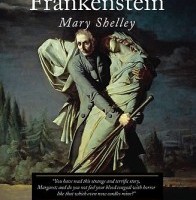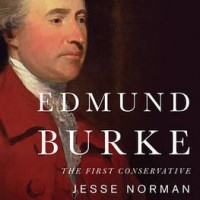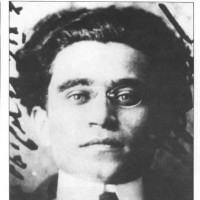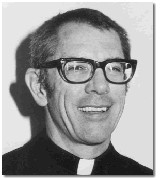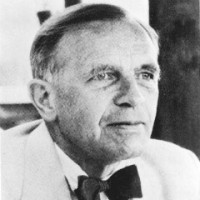Frankenstein: Prometheus Mythic & Modern, by Sean Fitzpatrick
The womb and the tomb—one of the most striking mirror images that our lives have to offer. Babies are buried alive in their warm mothers’ girth. Bodies are dead and buried in their cold mother earth. For one, there is the darkness of genesis and growth, for the other, the darkness of death and decay. The former are born to live for a span; the latter will be reborn to live for an eternity.
This pregnant parallel has been given immortal imagery in Mary Shelley’s Frankenstein; or, The Modern Prometheus. The mythic Prometheus is famous for creating men. The modern Prometheus is infamous for creating monsters. Both are tormented as a result of their creations, punished for the prideful usurping of a creative power that ultimately renders their creation deficient. The mythic Prometheus suffers for defying the supernatural, the modern Prometheus for defying the natural.
On what wings dare he aspire? What the hand, dare seize the fire?William Blake’s poem, “The Tyger,” instigates a dark literary trend of creature questioning and creator cursing, whose questions and curses are echoed by Milton’s Adam, and again by Shelley’s demon. For all of its modern connotations, however, Frankenstein represents an old story of creature rebellion. These rebellions had their birth with Lucifer’s “Non serviam,” and continue to rage with every fit of fallen nature and every man-made object that enslaves man. Victor Frankenstein is both rebel and victim of rebellion, as he turns his back on the order of things, forging into territory reserved for gods, only to be beset by the monstrous offspring of his sin. And as a monster, the creature is very much made in the image and likeness of his creator.
The story of Frankenstein is the quintessential mad scientist story, given immortal voice by Colin Clive in the 1931 film with his unforgettable, “It’s alive!” The story is, without doubt, alive—infused with life by the prevalent failure to recognize and respect the world’s sacrosanct and secret powers. Frankenstein and his monster stand as truly horrifying cultural icons of an enlightened era devoted more to science than to art. It has been said that the opposite of art is science. Art has everything to do with emotion, inspiration, and sacred mysteries. Science has nothing to do with any of these things, dealing instead with comprehension, investigation, and material calculations. As art can perfect nature, so science can pervert nature.
Read the complete article in The Imaginative Conservative
Burke, Party, and the Human Person, by J.P. O’Malley
The philosopher and statesman Edmund Burke is often lauded as the founder of modern conservatism. Burke was born in Dublin in 1729 and educated at Trinity College. In 1750 he moved to London, where he stayed for the remainder of his life.
When he arrived in London, Burke had a very brief career in law, but he soon dedicated his life full-time to critical thinking, writing, and politics. Over his long and distinguished career Burke published a number of groundbreaking books, including A Philosophical Enquiry into the Origin of Our Ideas of the Sublime and Beautiful and Reflections on the Revolution in France.
Burke lived during an extraordinary period in British history, where his good friends included Samuel Johnson, Adam Smith, and David Hume.
In his new book, Edmund Burke: The First Conservative, Jesse Norman dissects Burke’s outstanding intellect and his career. He then asks how Burke’s ideas might be applied to modern politics.
Jesse Norman is a Conservative MP for Hereford and South Herefordshire in the UK. He is a senior fellow at the UK think tank Policy Exchange and has taught philosophy at University College London and Birkbeck College.
In the book you discuss how Burke believed the only way to destroy what he insisted was the “King’s network of patronage” was through political parties. Can we see this as the precursor for the modern political party?
Well, the idea of a political party for Burke is contrasted with the idea of a faction, which is a group of people who come together to achieve a goal. They have no further glue that keeps them together after this goal and therefore they tend to disperse. In opposition to that idea is a party, in which a group of people are united around a principle that cannot be exhausted. Therefore they do not disperse after some particular achievement. They maintain themselves.
What is so fascinating about Burke’s conception of a political party is that he then builds into this a wider notion of what you might call a para-constitutional role. This is where political parties serve a number of functions: they act to debate, to create an oppositional government, to train and recruit political talent, and to make political principles more effective and create an open government.
So I think when people denounce political parties now within our current political system, they are often unaware of the alternatives. And the alternatives are a system of factions, which you see in the eighteenth century, before the idea of party politics really took over. If it’s not a politics of faction, then you get a politics of special interests: this is what you see in America presently, where very lightly whipped parties are dominated by a money interest.
You describe Burke as one the earliest postmodern political thinkers. You also refer to him as one of the greatest critics of the modern age and of liberal individualism. Can you briefly talk about this?
Well Burke is not a postmodernist in the sense that he does believe that there is truth and falsehood. He doesn’t believe that everything is a matter of narrative or power relations. But he is a postmodern: that is to say his thought contains within it a critique of modernity. And that critique begins with an understanding of human nature. Because where modernity goes wrong—from a Burkean perspective—is in the application of human nature to our reasoning of human affairs.
That is something that you find within liberal individualism: this idea of treating a human being as a mere economic agent. This gives rise to cultural feedback that then bends the nature of humans, because they react to how they are understood. So you have this perception that people are simply motivated by greed and fear. That greed-and-fear psychology then gets embedded in a culture.
But what Burke says is that humans are not mere economic agents; what really matters is how they link with each other. We cannot see people only in terms of incentives, but in terms of habits and affections as well.
When you do that, you get a rich conception of the social order. It’s an idea where people are not just driven by greed.
You get a much better idea and understanding of how people actually behave. You also avoid these effects where people are encouraged to be greedy, and therefore they become greedy as a result.
Read the complete interview in The University Bookman
La France meurt de l’hégémonie marxiste, by Guy Milliere
Voici une dizaine de jours, c’était le premier anniversaire de la présidence de François Hollande. Triste anniversaire.
Ceux qui voudraient mettre quoi que ce soit à l’actif du « Président normal » auraient bien des difficultés à trouver quoi citer. L’endettement du pays continue à se creuser. Les chiffres du chômage poursuivent leur ascension. Les pauvres se multiplient, comme toujours lorsque les socialistes sont au pouvoir. Les projets fiscaux les plus ineptes énoncés lors de la campagne électorale n’ont pas vu le jour, mais la fiscalité ne s’en est pas moins trouvée alourdie. L’ombre de la duplicité et de l’hypocrisie, qui s’est déployée avec l’affaire Cahuzac, ne cesse de projeter ses effets de délégitimation.
C’est sur ce fonds malsain que se sont déroulé les manifestations contre la seule « réforme » que François Hollande ait vraiment menée jusqu’au bout : celle du mariage.
La dimension de destruction de la famille qui s’y love a suscité un vaste mouvement de rejet qui n’aurait sans doute pas acquis cette ampleur s’il n’avait pris appui sur une inquiétude plus large.
En sa grande majorité, la population française perçoit que le pays est en déclin et que le déclin s’accentue jusqu’à ressembler à une maladie en phase terminale.
La perception du déclin, visible dans tous les sondages, s’accompagne d’un désarroi, d’une angoisse, d’une dépression collective tout à fait explicables.
Sans doute parce que nous sommes au printemps, certains ont vu dans les réactions de désarroi, d’angoisse et de dépression collective les traces d’un « printemps français ». J’aimerais penser qu’ils ont raison, mais je dois dire que je suis circonspect.
Il ne se dessine, en effet, aucun sursaut, aucune esquisse de perspective.
Les gens de gauche pensent, pour la plupart, que François Hollande n’est pas assez à gauche, autrement dit qu’il n’a pas été assez loin dans la progressivité fiscale, et ils sont plus que jamais enferrés dans la débilité envieuse qui les conduit à considérer qu’il suffit de s’en prendre aux plus entreprenants pour que tout aille mieux. Nombre de gens de droite sont porteurs de propositions teintées des mêmes idées stupides.
Les explications de l’évolution économique planétaire, des paramètres de la globalisation, de la croissance qui se poursuit ailleurs sur la planète, et qui ne déserte que le continent européen, sont absentes.
Le vieillissement accéléré que connaît l’Europe, les incitations qui sous-tendent les flux migratoires complexes qui strient celle-ci et en font fuir les porteurs de capital intellectuel, ne sont jamais évoqués.
La France, comme une part majeure du continent européen, est soumise au règne absolu d’une hégémonie marxiste, anticipée par le communiste italien Antonio Gramsci dans les années 1930. Gramsci pensait que le capitalisme, dans la première moitié du XXe siècle, était en position hégémonique. Il préconisait une longue marche des adeptes du dogme marxiste dans toutes les institutions, jusqu’à ce que l’hégémonie capitaliste soit remplacée par une autre hégémonie, marxiste celle-là.
Il précisait que, lorsque cette hégémonie marxiste serait en place, une irréversibilité serait atteinte. Tous les débats alors, disait-il, auraient lieu au sein de l’hégémonie marxiste ainsi instaurée et sur son horizon. Toute possibilité de raisonner à l’extérieur de l’hégémonie marxiste serait condamnée à être marginalisée. Des mouvements de colère contre l’hégémonie marxiste instaurée pourraient encore exister, mais ils ne pourraient plus se doter des paramètres indispensables pour constituer une alternance.
Read the complete article in Les 4 Vérités
On the Reading of Books, by Rev. James V. Schall, S.J
On Thursday, May 1, 1783, with “the young Mr. (Edmund) Burke” present, Samuel Johnson remarked: “It is strange that there should be so little reading in the world and so much writing. People in general do not willingly read if they can have anything else to amuse them.” The word “reading” here does not mean, say, the reading of e-mails, which are read immediately on reception. Rather, “reading” here means setting aside time and giving attention. Reading is an actively passive occupation. I never read without a pencil, except perhaps when reading my breviary (but this is only because, if I had a pencil over lo these many years, the whole four volumes would be underlined).
The subject of the pleasure of books was recently brought to my attention by the unexpected gift of a used book, Christopher Morley’s 1919 classic The Haunted Bookshop, a book I had never heard of before. Mr. Mifflin, the proprietor of the Haunted Bookshop, when asked by a young man whether a used book shop is not “delightfully tranquil,” replied, “Far from it. Living in a bookshop is a little like living in a warehouse of explosives. Those shelves are ranked with the most furious combustibles in the world — the brains of men.”
So it was sobering to read Johnson, who added: “No man reads a book of science from pure inclination. The books that we do read with pleasure are light compositions, which contain a quick succession of events.” Johnson then went on to admit, however, that he had recently read the complete works of Virgil with great pleasure.
So the question of reading must include, “The reading of what?” And I suppose a distinction can be found between reading for pleasure and the pleasure of reading. I can well imagine reading a scientific book with pleasure, coming across the explanation of something that had long puzzled us, now spelled out in coherent and clear form.
Read the complete article in The Imaginative Conservative
What if we dumped Rand for Röpke?, by Joel J. Miller
After addressing Ayn Rand’s anti-Christian philosophy, I think it’s important to propose an alternative. This is particularly important for Christians who defend the free market and would like to expand economic freedom. Just because Ayn Rand is of the devil doesn’t mean that capitalism is too. They are not the same thing.
Sadly, some people seem to think so. “I think Christians would be less likely to embrace socialism if they understood that the economic philosophy of Ayn Rand is compatible with Christianity,” explains one pundit, as if those were our two choices: socialism and Randianism.
Read the complete article in Patheos
